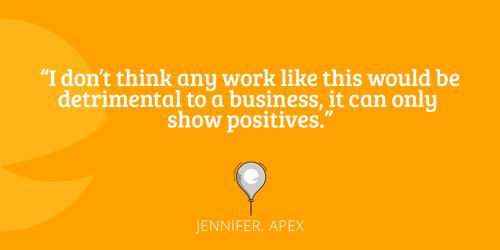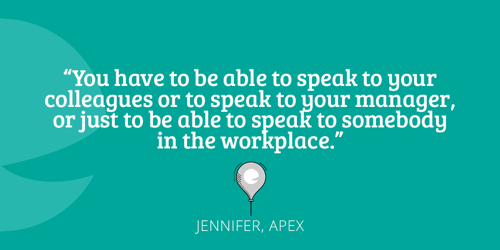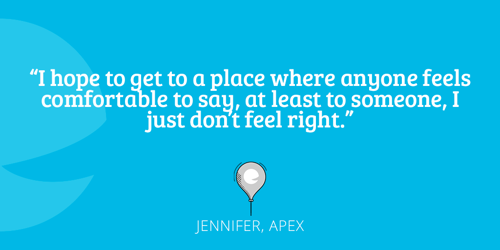
Improving Communications
Jennifer from Apex Hotels on the importance of communications, so people know where to get help and support
Organisation Profile:
- Number of employees: 1000+
- Location: UK Wide
- Sector: Hotel
- Who are they: Apex began in 1996 in Edinburgh. They are a family owned business with ten hotels in Edinburgh, Dundee, Glasgow, London, Bath.
Jennifer Matheson, HR Officer at Apex talks about why they got involved in WEF, the challenges they faced and how they are going to continue to move toward a workplace free from mental health stigma and discrimination.

When I first joined Apex they were very open to having new training, to allow me to bring new things into the business as well. Apex already supported staff with absences, with wellbeing, but I was very passionate about mental health and trying to ensure that everyone thinks of mental health the same as we think of physical health.
I took it to my boss about going on mental health first aid training and they were very open to allow me to do that and that has started the journey.
We'd already been in touch with See Me when we had done awareness days for wellbeing and mental health, so we already had a slight connection there. See Me got in touch with us about the pilot and we were delighted that we were one of the companies to be asked to get involved.
We're very grateful to be given the opportunity to have somebody come in and talk to our staff and give us feedback on what's gone well, what we can improve on. Because the more ideas that we have and the more people are talking about it the more it embeds it. We're a family owned company so family is a very strong ethos for Apex and one of our values is about trust. It's important that colleagues can trust one another, can trust the managers that if they are going to disclose that they are feeling low that they will be supported and helped as they would with any other concern that they raise.

You have to be able to speak to your colleagues or to speak to your manager, or just to be able to speak to somebody in the workplace. A lot of us sometimes can come to work and our home life might be affecting us at work, or it could be vice versa, your work is affecting you at home.
I was hoping to get really honest feedback from colleagues to say what Apex were doing well and what we could improve on and the survey that went out, people did. We had open questions as well and people came forward with suggestions.
We've started working on them and I see that as a long time frame project, I don't want any quick fixes in this and I don't think the company would want that either. I think it's more so a project that we embed into our culture and make sure that it's a live project so that it can keep changing as well. So as we learn more, as people might disclose more, people will also come with their own knowledge of their experience of what we've been through and we can learn from that and adapt our practices to best fit.
We learnt that quite a lot of colleagues were forthcoming in telling us information, which is really good because sometimes when you send our surveys you never know what kind of response you're going to get and you don't know if you're going to get enough responses. But all the responses that we got mean something and it gives us something to start working on so we were really appreciative of everyone that responded, that was what we were looking for, honest feedback, and that's what we got.
The initial improvement that we focused on was communication. We have not long introduced our employee app and that is immediate feedback, immediate communication for everybody that downloads the app. We have chat functions on there so people can get a hold of managers, of HR, if they have any queries we've got all our support documents on there, all our benefits and rewards.
We also continued our mental health first aid training for another year, so that's going on until the end of 2019 and hopefully longer. Now we are looking at having champions within the business.

I hope to get to a place where anyone feels comfortable to say how they are feeling, at least to someone. I'm not saying that everyone will feel comfortable to say to their direct manager or this person, that person, but at least have somebody in a business that you feel comfortable going to, to say I just don't feel right.
It makes it more current within the workplace, it makes it more embedded in the language that we use about wellbeing. I think it also helps managers see potential triggers so things that you might have just said, oh that's just a job or that's just normal, you start to think about things slightly differently. If you know somebody is having a hard time then you can perceive things a little bit more empathetically and think no actually this might be a difficult time for them, I'm going to help out a little more here.
It’s important to ensure that all businesses embed mental health within their organisation. It's important that leaders talk about it, include it in meetings, even 5-10 minute exercises at the start, a fun exercise can help massively. It really needs to be the leaders and the top managers embedding it so that it becomes the normal culture for their managers and their direct delegates and for everyone in the organisation.
To sustain improvements we would follow up with another survey to make sure that we know what staff, what colleagues think of the work that Apex are doing and constantly monitor that and constantly expand on that.
I definitely think it's a good idea that See Me have done this project. I don't think any work like this would be detrimental to a business, it can only show positives. Constructive feedback is what you need and that's not negative because you work on it and you improve on it and then you end up with a happier workforce.
